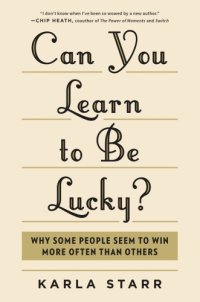
Ebook: Can you learn to be lucky?: why some people seem to win more often than others
Author: Starr Karla
- Tags: BUSINESS & ECONOMICS--Entrepreneurship, Interpersonal relations, Personality, PSYCHOLOGY--Interpersonal Relations, PSYCHOLOGY--Personality, Self-realization, PSYCHOLOGY -- Interpersonal Relations, PSYCHOLOGY -- Personality, BUSINESS & ECONOMICS -- Entrepreneurship
- Year: 2018
- Publisher: Penguin Publishing Group
- City: New York City
- Language: English
- epub
Introduction: What we talk about when we talk about luck -- Best in show: why lucky timing is out of our hands -- The Charlie Brewer principle: how that warm, fuzzy feeling leads to luck -- Bitches in glasses: the occasionally unlucky side of intuition -- How Sarah Palin happened: the infinite luck of being beautiful -- I got this: the lucky art of confidence and approaching rewards -- Find your thing: why gold medals require luck -- Check yourself prior to wrecking yourself: how self-control leads to lucky outcomes -- You had me at hello: the lucky art of conquering the interpersonal frontier -- My future's so bright, I gotta wear shades: the luck-enhancing mind-set of embracing your inner Kanye West -- Yes, and: curiosity, flexibility, open-mindedness, and the law of increasing the surface area of your luck.;"A talented journalist reveals the hidden patterns behind what we call "luck"--And shows us how we can all improve outcomes that only appear to be random. "Do you believe in luck?" is a polarizing question, one you might ask on a first date. Some of us believe that we make our own luck. Others see inequality everywhere and believe luck is the only possible explanation. Karla Starr has third answer: "random" outcomes have predictable causes; we call them lucky because their traces are so faint. In this groundbreaking book, Starr traces wealth, health, and happiness back to subconscious neurological processes, blind cultural assumptions, and tiny details you're in the habit of overlooking. Each chapter blasts open the hardware behind an outcome you thought was random and shows how to hack it. For instance: * You can beat the 10,000 hour rule if you pick the right skill at the right time, and have the right resources to train. * Your resume can't override the gut-level assumptions a potential employer makes about you based on the last employee who happens to look similar. * People make assumptions about your intelligence, kindness, and trustworthiness based on cues that have nothing to do with these traits. Starr ends each chapter with two liberating possibilities: Either harness the world's invisible biases to work to your advantage, or recruit your personal strengths to overcome these external factors. By ending the guessing game about how luck works, Starr allows you to improve your fortunes while expending minimal effort"--
Download the book Can you learn to be lucky?: why some people seem to win more often than others for free or read online
Continue reading on any device:

Last viewed books
Related books
{related-news}
Comments (0)